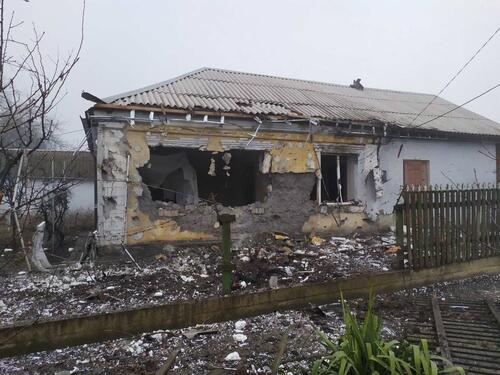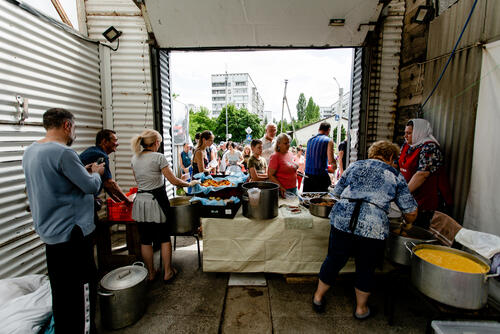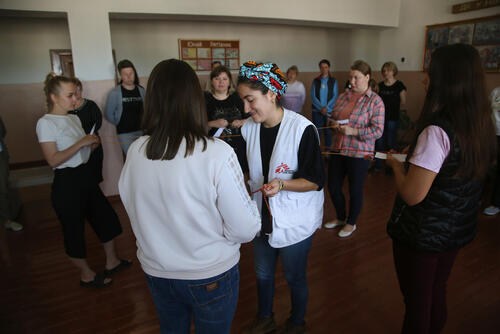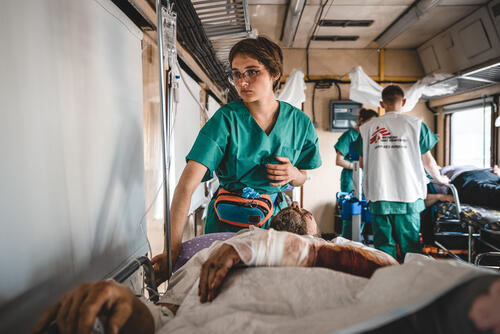In the besieged city of Mariupol, southeastern Ukraine, thousands of people, including staff from Médecins Sans Frontières (MSF) and families, remain cut off from the world. Laurent Ligozat, MSF’s emergency coordinator in Ukraine, shares his concerns about the safety of civilians in the city.
How is the situation in Mariupol? Are you in contact with our staff in the city?
The humanitarian situation in Mariupol is catastrophic. We know from our staff that they are desperately trying to keep safe as heavy attacks continue and food supplies run dangerously low. There is no water, electricity and heating. Internet and phone services have been cut off. Hospitals, supermarkets, and residential buildings have suffered heavy damages.
And it is not possible to bring any relief supplies into the city. We spoke to one of our staff through satellite phone on Friday (4 March) and today, and he shared how people are literally being forced to live off snow. So, we fear for the safety of our staff, as well as thousands of others who find themselves in such a harrowing situation.
It’s a principle of humanity to allow people to escape when war is raging. Civilians caught in conflict must be protected.Laurent Ligozat, MSF emergency coordinator Ukraine
What are you trying to do to ensure our staff can leave the city?
In such desperate circumstances, one would think that the only option people have is to escape. But it is not as simple as it sounds. For many of our staff, Mariupol is home, where they have families and friends. They have memories and feelings attached to the place. They know that if they leave the city now, they may never come back, they may never see their homes. This is not the first time they are seeing war. They have experienced it already, when eight years back Donetsk split between government and separatist-controlled territories, and they were cut off from many towns and cities across the contact line. So, they know it’s a life-altering choice for them.
For those who would like to leave, we are trying all we can to help. We are in touch with other organisations as well to see how we can work together to get our staff out of Mariupol. Some of our staff have cars, but for those who don’t we will make our cars available. But it goes beyond logistics. So, we are appealing to all power holders in Mariupol to ensure those who want to leave, can do so safely.
Why is MSF calling for safe passage?
It’s a principle of humanity to allow people to escape when war is raging. Civilians caught in conflict must be protected. For us, the most important thing is the safety and dignity of all people. Having worked on the frontlines of so many war zones, we have seen immense suffering.
We have seen the consequences of people being trapped in between fighting lines, so we want to make an appeal: spare civilian lives, spare all things people need to live a life with dignity. This means food supplies, water, heating, electricity. And allow those who want to leave to do so, and let those who want to stay, to live in peace and dignity. So, what we are essentially calling for is respect for human life.
We have been providing healthcare in eastern Ukraine for eight years, and now when the people need us more than ever, we will not abandon them.Laurent Ligozat, MSF emergency coordinator Ukraine
If all MSF staff leave, does this mean you will stop all activities in eastern Ukraine?
We have been providing healthcare in eastern Ukraine for eight years, and now when the people need us more than ever, we will not abandon them. We have more staff coming into Ukraine to support our medical emergency response. For now, our immediate priority is to provide essential medical supplies to hospitals running low on much-needed stocks, including surgical and trauma kits, to ensure they can continue providing emergency healthcare.
Many of the people in this part of Ukraine are elderly people with chronic health problems such as diabetes. So we are also looking at how we can supply some hospitals in eastern Ukraine with insulin. Ensuring continuity of care for people will also be a key focus for us as, for elderly people with chronic symptoms, disruptions in treatment can be life-threatening.






